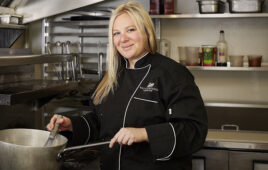In the first of this two-part series, Glenmoor Country Club’s Executive Chef explores the many different facets and traits necessary to succeed as an executive chef.
There’s a lot of hype surrounding the ideology of a professional chef. Perspectives range from your average greasy spoon devotee to the know-all, tell-all, experimental, trendy foodie.
To the first prospect, being a chef is as meaningless as being a local gas station clerk. There is no significance whatsoever as to whether the cheese blintzes were made from scratch or the mixed berry topping was made from fresh, macerated wild-berries.
At the other end of the spectrum, for the ever popular foodie, the chef takes the spotlight. Maybe it’s because the Osso Bucco came out so succulent, he or she was able to suck the meat right off the bone. Or, comparatively, because the steak au poivre was sent back for being too “peppery.” This is the patron who sees the chef as the one individual who is going to either make or break their dining experience. This is the patron who makes the effort to meet the chef for the sole reason of knowing the chef.
It’s perplexing that in recent years, the role of the Executive Chef has grown into a progressively more attractive, high profile, glamorous and enchanting career choice. We have the media to thank for that misconception. I see young cooks fresh out of culinary school so often make the mistake of walking into their first interview with an ill-conceived belief that they’ll get hired right away into a management position and be next in line for my job.
During the interview process here at Glenmoor Country Club (Cherry Hills Village, Colo.) I like to surprise these candidates with a spur of the moment stage: “Here’s an apron,” I say. “Here’s a chef’s coat, here’s a cutting board and a knife. Here is what you must work with. I need a menu in 10 minutes before you start cooking it.”
Often, the response I get is a look of fear and retreat from the overly confident individual who spent the first 12 minutes of our conversation talking about their skills, experience, creativity and ability to handle anything thrown their way.
What they don’t realize is that being a Chef is one of the most grueling, demanding, and arduous jobs one could ever take on. It involves so many different facets of talent, including the ability to pull something out of your ass at a moment’s notice. Not only do you have a kitchen and a crew to run, but you’ve got menu design, plate presentation, ordering needs, food cost, chemical budgets, labor budgets, sanitation training for your new dishwasher and line cook, and the next chef’s table menu to write with three of the eight guests having special dietary needs—oh, and let’s not forget, you’ve got to know how to burn.
The ability to burn—or in laymen’s terms, cook—is what got you into this position. Ironically, in an average week, I step onto the line and burn maybe twice, three times if I’m lucky. Once you step into the new office and don the coat with the words “Executive Chef” embroidered across the front shoulder, you can say good-bye to the daily burn as well as those infamous war wounds strewn up and down the insides of your forearms. You know the marks. The burns you got from working sauté, from oven racks, from crossing the line of fire of the hotter-than-shit sauté pan coming out of the hands of your sauté cook into the dish pit.
These are the unforgiving moments during a service that’s going down in flames that have made you come back for more. They have made you who you are. They have made you an executive chef.
That is the true glamor.



